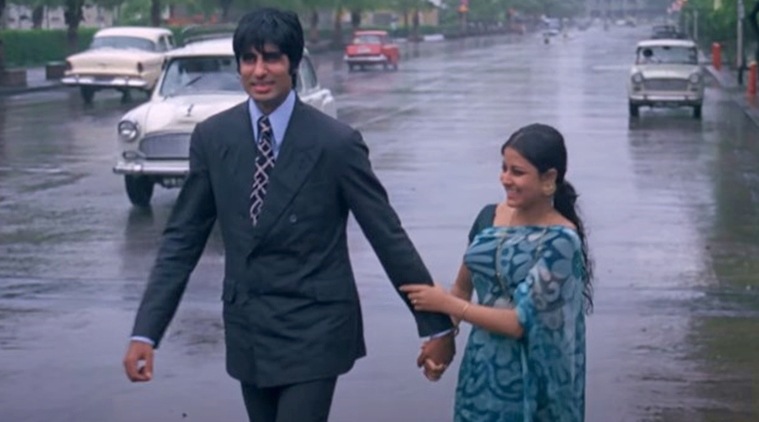Basu Chatterjee often declared his love for Mumbai through his songs.
If a music playlist was to be dedicated to filmmaker Basu Chatterjee, who died today because of prolonged ill health, it should aptly be titled ‘Bambai Meri Jaan’. Chatterjee, who gave us gems like Baton Baton Main, Piya Ka Ghar, Rajnigandha, presented Mumbai in a way that had never been seen before. His films portrayed the metropolis for the Bambai that it was, very much at home in the crowded local trains, and not the high and mighty Bombay with its sea-facing bungalows. Chatterjee’s Bombay included the bus stops, wet rocks on Bandstand, and an eager new couple exploring the city in the rains. He also took us deep into the Bandra Christian community as well as those of the Parsis, who have both defined the Mumbai that we see today. Chatterjee often collaborated with lyricist Yogesh Gaur, and they both painted a picture of a Bambai which was real and relatable for the rest of the country. Though Chatterjee, along with Hrishikesh Mukherjee, pioneered the middle-of-the-road films, where the new, emerging middle class of India was the hero, the music in his films was anything but middle. The songs were all shot with a keen eye on the landscape of the fast-paced city, and we would witness romance blossoming across a train compartment, or where a painfully shy young man would dream of singing a love song to his beloved as he saw in the movies.
Here are the five must-have songs on the Basu Chatterjee playlist.
Rimjhim gire saawan (Manzil, 1979)
With the Mumbai skies already grey in anticipation of the long spell of rains, this song picturised on Amitabh Bachchan and Moushumi Chatterjee is the uncrowned king of all rain anthems. There are two versions of the song, one the male one sung by Kishore Kumar, and the other by Lata Mangeshkar. The male one is shot at a mehfil of sorts, where Bachchan is playing a harmonium, but it’s the female one that really makes it rain. Moushumi and Bachchan frolic around the city, she in a printed teal green sari, and him in a grey suit. Holding hands, the very-much-in-love duo prance around the Queens’ Necklace and the Oval Maidan. Moushumi Chatterjee is barefoot at times and runs to keep up with the long strides of her partner. Oh, to be so young and in love. The perfect track to go around and prance in the rain.
Na jaane kyon (Choti Si Baat, 1976)
The song that can boast of having a cameo by a bus stop. Vidya Sinha, who takes the bus every day to her workplace, is pining for Amol Palekar, who is currently away to rediscover himself. The song, sung by Lata Mangeshkar, is pictured on Sinha as she goes about her daily routine. She takes the bus from Charni Road — the double-decker red Best bus — finishes her workday and then comes back and lounges on her balcony. These are days of a pre-congested Mumbai, and balconies were amply big. There are also trips to the theater, and again, we have the bus stop. While the other track of the film Jaaneman jaaneman sung by Yesudas marked his debut in the Hindi film industry, and became a bonafide hit, it’s Na jaane kyon that remains an ode to love and longing.
Suniye, kahiye (Baton Baton Main, 1979)
One can almost feel the wind and taste the salt from a rather windy day at Bandstand, as Tina Munim and Amol Palekar have their first date on the rocky wet sea-facing promenade. The song takes us through the entire gamut of their courtship as they have dinners, evening teas and sit on the opposite ends of a train compartment on their way to work. The morning commute is an essential plot point in the film — that’s where the two met — and we even see notes being passed by helpful co-passengers. We also see poolside cafes and leisurely conversations.
Na bole tum na maine kuch kaha (Baton Baton Main, 1979)
This foot-tapping ditty is a tribute to the gymkhana club culture of the Bombay of yesteryears. The late Ranjit Chowdhury, who plays a music aficionado and a violin player, is singing to a large group of young party-goers. Everyone is dressed in bell-bottom jeans and flared maxi dresses, this song was the definition of cool in the late 70s. The film itself was a nice peek into the Bandra Christian community, and yes, partying and dancing was an integral part of the same. Later in the song, Palekar and Munim take to the dance floor and the microphone.
Bambai shahar ki tujhko chal sair kara doon (Piya Ka Ghar, 1972)
While the other track Yeh jeevan hai that became synonymous with the film, but Bambai shahar delivers on its name. Newlyweds Anil Dhawan and Jaya Bhaduri are on their first-ever tour of Mumbai as a couple. They take the Western line, like most proud Mumbaikars, and they visit the Gateway of India, do a roundabout of Flora fountain, and also visit the Byculla Zoo. The double-decker Best bus also features in the song and so does the humble kaali-peeli taxi. The day ends with the two sharing a nariyal paani, at one of the many beaches of Mumbai. The film itself was a satire on urban housing and the need for space as the city dealt with an increasing population.
? The Indian Express is now on Telegram. Click here to join our channel (@indianexpress) and stay updated with the latest headlines
For all the latest Entertainment News, download Indian Express App.
Source: Read Full Article





